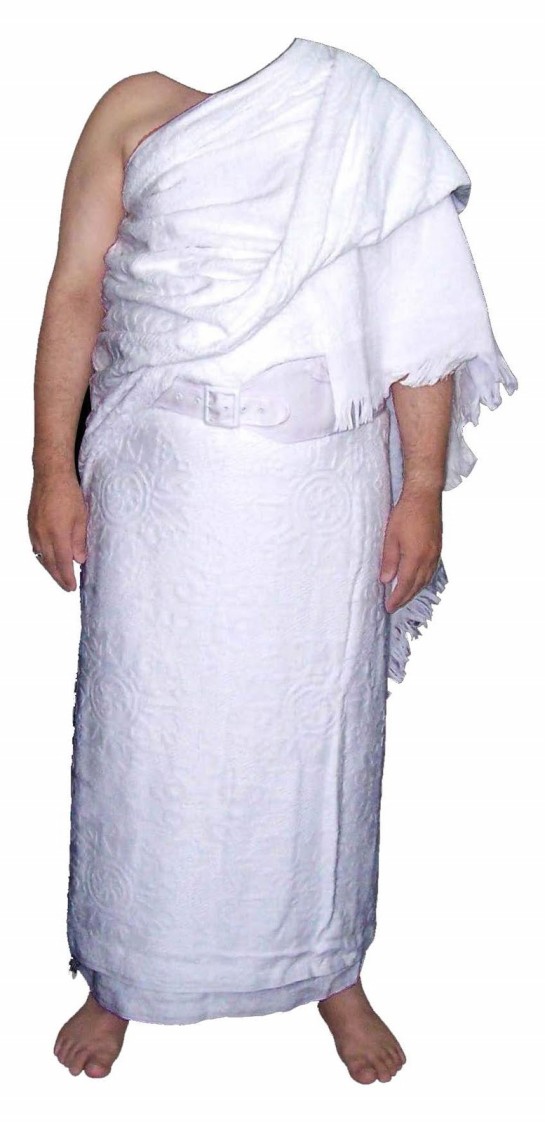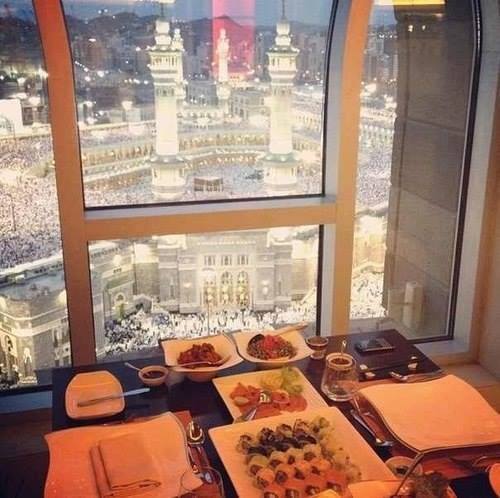Ihram ( إحرام ) is an Arabic word that denotes a sacred state in which a Muslim must enter in order to perform Umrah or Hajj. The Ihram has two aspects: Zone (Miqat) and Clothes (Libas)
IHRAM OF THE MIQAT ( ميقات ) ZONE
The Miqat is the place where every pilgrim must wear their ihram and make intention to perform Umrah or Hajj. The pilgrim must not pass this zone without ihram; otherwise they will have to pay fidyah (penalty). The Messenger (saw) specifically named the Mawaaqeet (zones) and for whom they are applicable.
وقت رسول الله صلى الله عليه وسلم لأهل المدينة ذا الحليفة ولأهل الشام الجحفة ولأهل نجد قرن المنازل ولأهل »
صحيح البخاري- كتاب الحج] ]« اليمن يلملم
The Messenger (saw) said “ (the Miqat) for the people of Madinah is Dhul Hulaifah, for the people of Sham is Al Jahfah, for the people of Najd is Qarn Al Manzil and for the people of Yemen is Yalamlam. [Bukhari – Chapter: Hajj]
سنن النسائي- كتاب مناسك الحج] ] « أن رسول الله صلى الله عليه وسلم وقت لأهل العراق ذات عرق »
The Messenger (saw) said “For the people of Iraq (their Miqat is) Dhaat ‘Irq” [Nasai – Chapter: The Rites of Hajj]
The Mawaaqeet (Zones) For Umrah And Hajj مواقيت العمرة والحج
There are five zones:
- Dhul Hulaifah ( ذا الحليفة ) is 450km to the north of Makkah and is the Miqat for the people of Madinah
- Al Juhfah ( الجحفة ) is 187km north-west of Makkah; people also call it Rabigh, usually for people from
Jeddah and also those coming from Syria, Jordan, Palestine and Lebanon.
- Qarn Al Manazil ( قرن المنازل ) is 94km to the east of Makkah overlooking Arafah and is the Miqat for the
people of Najd.
- Yalamlam ( يلملم ) is 54km to the south of Makkah and is the Miqat for those coming from Yemen
- Dhatu Iriq ( ذات عرق ) is 94km to the north-east of Makkah and is the Miqat for the people of Iraq.
However today it has become common practice for the pilgrims to wear their ihram before reaching the Miqat and to make their intention once they reach the zone. If you travel to Hajj by plane, they will announce when to wear the ihram and make niyah (intention). Those pilgrims not flying will make ihram at the closet Miqat to them and those residing inside the zone i.e. (Makkah) will start from where they are.
IHRAM OF THE LIBAS ( لباس الاحرام ) CLOTHES
A person that is in the state of ihram is called muhrim (masculine) and muhrimah (feminine)
THE HAJJ CLOTHING FOR MEN لباس الاحرام الرجال
The Men’s clothes entail two helmless towels (colour white preferred) and slippers.
- Ridaa’ ( رداء ): is the towel used to cover the upper torso.
- Izaar ( ازار ): is the lower towel, sometimes this is clipped on by a belt
or safety pin. It must cover between the navel and knees.
- Ni’aal ( نعال ): are the slippers, the straps should not cover majority of
the feet. In ihram you cannot wear shoes of any form.
The Messenger Muhammad (saw) said,
“let some of you wear Ihram with the Izaar, Ridaa’ and Niaal.”
The recommended acts before putting on the ihram
It is recommended for the muhrim to clip his fingernails, trimming the moustache, shave off the hair from under the armpits, shave the pubic hair, make ablution or preferably taking a complete bath (ghusl), to comb their beard and hair.
Ibn ‘Umar said: “It is Sunnah for a pilgrim to take a complete bath before entering the state of ihram or before entering Makkah.” This is reported by Al-Bazzar, Ad-Daraqutni, and Al-Hakim, who considers it a sound hadith.
Perfume may be used on the body as well as the Hajj clothes initially, even if it continues to smell afterwards.
Ibn ‘Abbas said: “Allah’s Messenger (saw) combed his hair, wore some perfume, put on his Hajj clothes, along with his Companions, and then he set out from Madinah accompanied by them” reported by Bukhari.
Once in the state of Ihram do not put perfume or cover your head with anything such as a hat.
THE HAJJ CLOTHING FOR WOMEN
Women’s clothes entail Khimar and Jilbab, without Niqab or gloves.
The Messenger Muhammad (saw) said: ‘women who make Ihram should not cover their face nor wear gloves’
The women may temporarily cover her face by her hand, or make sadlu which is to bring the khimar slightly over the face temporarily to shield the face from foreign men. If she keeps the covering on for longer than necessary she will have to pay fidya (penalty) for this.
Women usually cover using the following:
- Khimar: A head scarf which must cover up to the jabe (chest)
- Jilbab: The outer garment which must be loose
- Niqab: A face veil (NOT ALLOWED IN IHRAM)
- Kinah: A mask from leather used a lot by the women from Kuwait
and other Khaliji (Gulf) states (NOT ALLOWED IN IHRAM)
There is no restriction for the woman regarding the colours she can wear. White is the best colour to wear at the time of Hajj, however for women they must take care to wear a dark tunic beneath it so that the sun will not shine through it and thus show off their form. The feet is considered awrah by the majority of the schools of thought (Hanafi do not accept this), so the women is allowed to wear socks and shoes whilst in ihram.
CONDITIONS IMPOSED WHILST IN IHRAM
What is permitted in Ihram?
- Bathing and changing
- Women to wear shoes
- Cupping, opening abscess, pulling a tooth
- Wearing a belt or ring
- Wearing non-perfumed kohl to the eyes
- Killing flies or harmful animals
- Sitting under the shade of a umbrella, tree or even a tent
What is prohibited in Ihram?
Sexual intercourse
- Fighting or arguing
- Wearing sewn clothes
- Cutting the hair
- Trimming the nails
- Using perfumed soap
- Wearing perfume
- Wearing hats (men)
- Getting engaged
- Getting married
- Hunting
You must pay a penalty if you commit any of the acts prohibited in ihram, which will usually mean an extra sacrifice.







You must be logged in to post a comment.